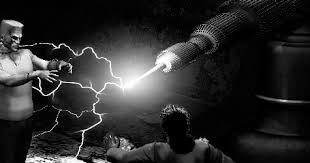 by Madeleine Kando
by Madeleine Kando

During the debates, all democratic presidential candidates were for universal health care. It would be weird if one of them had said:
‘I don’t think everybody should be able to afford health insurance. It’s against the freedom of the individual.’
At least they all agreed on the Universal Healthcare part. What they did not agree on was on how to achieve it. Sanders and Warren were the only ones for a
Single Payer health care system, which is the same as
Medicare for All, i.e. a government funded system. Plain and simple.
The other candidates were all over the place. Some were proponents of building on Obamacare, others were for a ‘Medicare for most’, meaning lowering the age at which you qualify for Medicare, and others still had a problem with doing away with the employer-provided health care system. The whole debate was so confusing and contradictory that most viewers probably tuned out and just watched the candidates’ lips move.
Everybody agrees that the health care issue is incredibly complicated. But is it? Or does it seem complicated because the candidates purposely keep it opaque, ambiguous and only talk about it in generalizations?
What makes it confusing is that they give one option different names. For example, single payer and Medicare for all is the same thing. It means that the government pays for health care. But they don’t specify what kind of single payer system they envision. Is it a government that pays and provides the services, like in England, or is it a government that pays the bills but a private sector that provides the services, like in Canada?
Contrary to what most people believe, universal health care in most European countries, entails a government-regulated network of private insurance companies. The government heavily regulates the industry, including hospitals and doctors. Hospitals are non-profit and heavily subsidized by government. This would be one advantage of a single payer system. If the services and payment for those services are one and the same entity, i.e. the government, it wouldn’t make sense to charge exorbitant hospital fees. It would self-regulate. That is where the ‘Public Option’ comes in: An insurance plan provided by the government that would compete with the private insurance companies. If it is cheaper, why not choose it? A government has much more bargaining power than all the private insurers combined.
 |
| The different options on how to achieve Universal Healthcare |
Contrary to a true single payer system, like Canada or Britain, Medicare in the US is NOT free. Most people on Medicare have supplemental insurance to cover many gaps that Medicare leaves open.
Most European countries have Universal Healthcare. It is universal because everybody has insurance. Not only do they have insurance, but they
have to have insurance. That is what the Republicans scrapped in 2017. It’s called the
Individual Mandate.
Can you imagine if car insurance was voluntary? Only the people who got into an accident would have to pay and the cost would skyrocket. Now we are stuck with an expensive system in which the cost is not shared by the whole population, healthy OR sick.
Read more...
 by Tom Kando
by Tom Kando




















